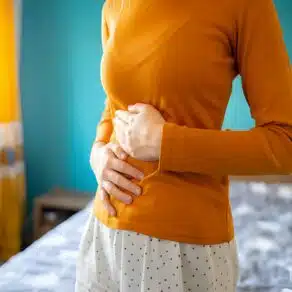Introduction: Endometriosis is a complex and often debilitating condition affecting millions of women worldwide. Among its myriad symptoms, endometriosis-related diarrhea stands out as a particularly distressing manifestation. In this article, we delve into the causes, symptoms, and management strategies for this challenging aspect of endometriosis.
- Understanding Endometriosis and its Effects:
- Causes of Endometriosis-Related Diarrhea:
- Symptoms of Endometriosis-Related Diarrhea:
- Management Strategies:
Understanding Endometriosis and its Effects:
Endometriosis is a chronic condition where tissue similar to the lining of the uterus grows outside the uterus. This tissue can be found on the ovaries, fallopian tubes, outer surface of the uterus, and other pelvic organs. During menstruation, these abnormal tissue growths respond to hormonal changes, leading to inflammation, pain, and a range of gastrointestinal symptoms, including diarrhea.
Causes of Endometriosis-Related Diarrhea:
The exact mechanism behind endometriosis-related diarrhea is not fully understood, but several factors contribute to its development:
- Inflammation: The presence of endometrial tissue outside the uterus can lead to chronic inflammation in the pelvic region, affecting nearby organs such as the bowel. This inflammation disrupts normal bowel function, leading to diarrhea.
- Hormonal Influence: Hormonal fluctuations throughout the menstrual cycle can exacerbate gastrointestinal symptoms in women with endometriosis. Prostaglandins, hormones involved in uterine contractions during menstruation, can also affect the bowel, leading to diarrhea.
- Pelvic Adhesions: Endometrial growths can cause adhesions or scar tissue to form between pelvic organs, including the bowel. These adhesions can distort the normal anatomy of the intestines, leading to bowel irregularities such as diarrhea.
Symptoms of Endometriosis-Related Diarrhea:
Endometriosis-related diarrhea presents with symptoms similar to other forms of diarrhea but often occurs in conjunction with pelvic pain and other signs of endometriosis. Common symptoms include:
in this article
- Frequent loose or watery stools
- Abdominal cramping or pain
- Bloating and discomfort
- Urgency to have a bowel movement
- Blood or mucus in the stool (less common)
Management Strategies:
Managing endometriosis-related diarrhea involves a multidisciplinary approach aimed at relieving symptoms and improving quality of life. Here are some strategies:
- Pain Management: Over-the-counter pain relievers such as ibuprofen or acetaminophen can help alleviate pelvic pain associated with endometriosis. In severe cases, your doctor may prescribe stronger pain medications or recommend other pain management techniques.
- Hormonal Therapy: Hormonal therapies such as birth control pills, hormonal IUDs, or GnRH agonists may help regulate hormonal fluctuations and reduce symptoms of endometriosis, including diarrhea.
- Dietary Modifications: Some women find relief from gastrointestinal symptoms by making dietary changes. Avoiding trigger foods such as dairy, gluten, caffeine, and spicy foods may help reduce diarrhea and bloating. Increasing fiber intake and staying hydrated can also promote regular bowel movements.
- Stress Management: Stress can exacerbate symptoms of endometriosis, including diarrhea. Practicing relaxation techniques such as yoga, meditation, or deep breathing exercises may help reduce stress and improve overall well-being.
- Surgery: In severe cases of endometriosis where conservative treatments fail to provide relief, surgery may be necessary. Surgical options include laparoscopy to remove endometrial growths or hysterectomy in cases of extensive disease.
Conclusion: can significantly impact the quality of life for women living with this condition. By understanding the underlying causes and implementing appropriate management strategies, individuals can find relief from symptoms and improve their overall well-being. If you experience persistent diarrhea or other gastrointestinal symptoms associated with endometriosis, it’s essential to consult with your healthcare provider for proper evaluation and treatment. With proper care and support, women with endometriosis can lead fulfilling lives despite the challenges posed by this condition.





